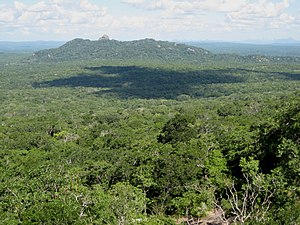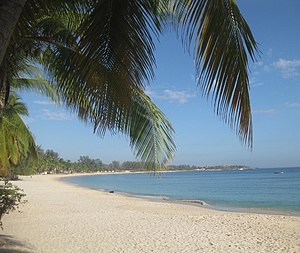Cabo Delgado Province
Cabo Delgado is a province of Mozambique. It has an area of 78,778 km² and an approximate population of 1,606,568 as of 2007. Pemba is the provincial capital. It also includes the municipalities of Mocímboa da Praia and Montepuez.
Within its ecoregions are the Inhambane Coastal Mosaic Rainforest and the Eastern Miombo Bushveld.
It is also an area rich in offshore gas fields that are beginning to be exploited by French and American multinationals.
Since 2017 the province has been the focus of an Islamist insurrection.
Geography
The province has an area of 80,145 km². It is the northernmost of Mozambique's provinces. It limits to the north with Tanzania, from which it is separated by the Ruvuma River; to the east with the Indian Ocean; to the south with the province of Nampula from which it is separated by the Lúrio river; and to the west with the province of Niassa, being the limit the river Ruvuma.
Population
According to 2020 data, the population of the province is 2,300,000 people, of which 58% are Muslim.
The population of the province stood at 1,632,809 in the 2007 census, compared to 1,284,000 in the 1997 census. Its population is made up of Makuas, Makondés and Quimuanes.
History
Occupied the eastern part of the Niassa Company. For years it has been one of the most forgotten regions of Mozambique. During the independence war between 1964 and during the civil war between 1977 and 1992 Cabo Delgado presented the highest rates of illiteracy, inequality and child malnutrition in the country.
In 2019, it suffered the ravages of Cyclone Kenneth, which hit the north of the province, causing at least 38 deaths. Thousands of houses were destroyed.
Gas exploitation
Several French multinationals such as Total, Technip and EDF and Americans such as Anadarko have settled in the province to exploit its gas reserves. These economic projects are generally not popular with the population as they are accompanied by the presence of international private security companies, increased militarization and the displacement of people. In addition, they constitute a serious environmental threat: «the coastal area affected by this future gas market is home to exceptional flora and fauna, certain species considered endangered by the International Union for Conservation of Nature, as well as ecosystems. weird. », pointed out in 2019 the newspaper L'Humanité.
Islamist insurgency
According to the first study on the Islamist insurgency in the district of Mocimboa da Praia, in the province of Cabo Delgado, the rebels are financed by the illegal traffic of wood and rubies. The group, known locally as "Al-Shabaab" - unrelated to the Al Shabbaab group that operates in Somalia - or as "Al-Sunna", began its operations in Cabo Delgado first as a religious but at the end of 2015 decided to establish military cells The first major attack occurred on October 5, 2017 when around thirty armed men launched an attack on a police station and an army barracks in Mocimboa da Praia and managed to steal numerous weapons and ammunition. A year later the Mozambican authorities claimed that they had arrested 470 members of this sect for using prohibited weapons, homicide or mercenary work.
Since 2017, the group has been responsible for numerous attacks that have destroyed important infrastructure such as government headquarters buildings and banking agencies.
In February 2019, the jihadists attacked for the first time convoys of the US oil group Anadarko, which is preparing with other groups to exploit gigantic offshore gas fields in that region.
In June 2019, the jihadist group Islamic State claimed for the first time to be involved in fighting against the Mozambican Armed Forces. Although according to some experts it is doubtful that ISIL is present, connections with radical local groups that demand strict application of Islamic law are not ruled out.
According to 2020 data presented by the NGO Armed Conflict Location and Event Data Project (Acled), from 2017 to 2020 this violence has caused more than 1,100 deaths, of which 700 were civilians. According to the authorities, it has also caused the displacement of at least 150,000 people.
Administrative division
Province formed by the following seventeen districts, which in turn are subdivided into administrative posts.
- City of Pembafounded as Puerto Amelia.
- Ancuabe:
- Metoro,
- Meza.
- Balama:
- Impiri,
- Kwekwe,
- Mavala.
- Chiúre:
- Chiúre Velho,
- Katapua,
- Mzeze,
- Mamogelia,
- Oqua.
- Ibo:
- Quirimba.
- Macomia,
- Chai,
- Mucojo,
- Quiterajo.
- Mecufi:
- Murrebue.
- Meluco:
- Move.
- Mocimboa:
- Mocimboa da Praia,
- Diaca,
- Mbau.
- Montepuez:
- Look at you,
- Nairoto,
- Namanhumbir.
- Mueda:
- Chapa,
- Imbuho,
- Negomano,
- Ngapa.
- Muidumbe:
- Chitunda,
- Miteda.
- Namuno:
- Hucula,
- Machoca,
- Meloco,
- Ncumpe,
- Luli.
- Nangade:
- Ntamba.
- Palma:
- Olumbe
- Pundanhar
- Quionga.
- Pemba Metuge:
- Metuge,
- Mieze.
- Quissanga:
- Bilibiza,
- Mahate.
It has the cities of Mocimboa da Praia, Montepuez and Pemba, its capital.
Contenido relacionado
Marseilles
Ibon
Berrocalejo (Caceres)


